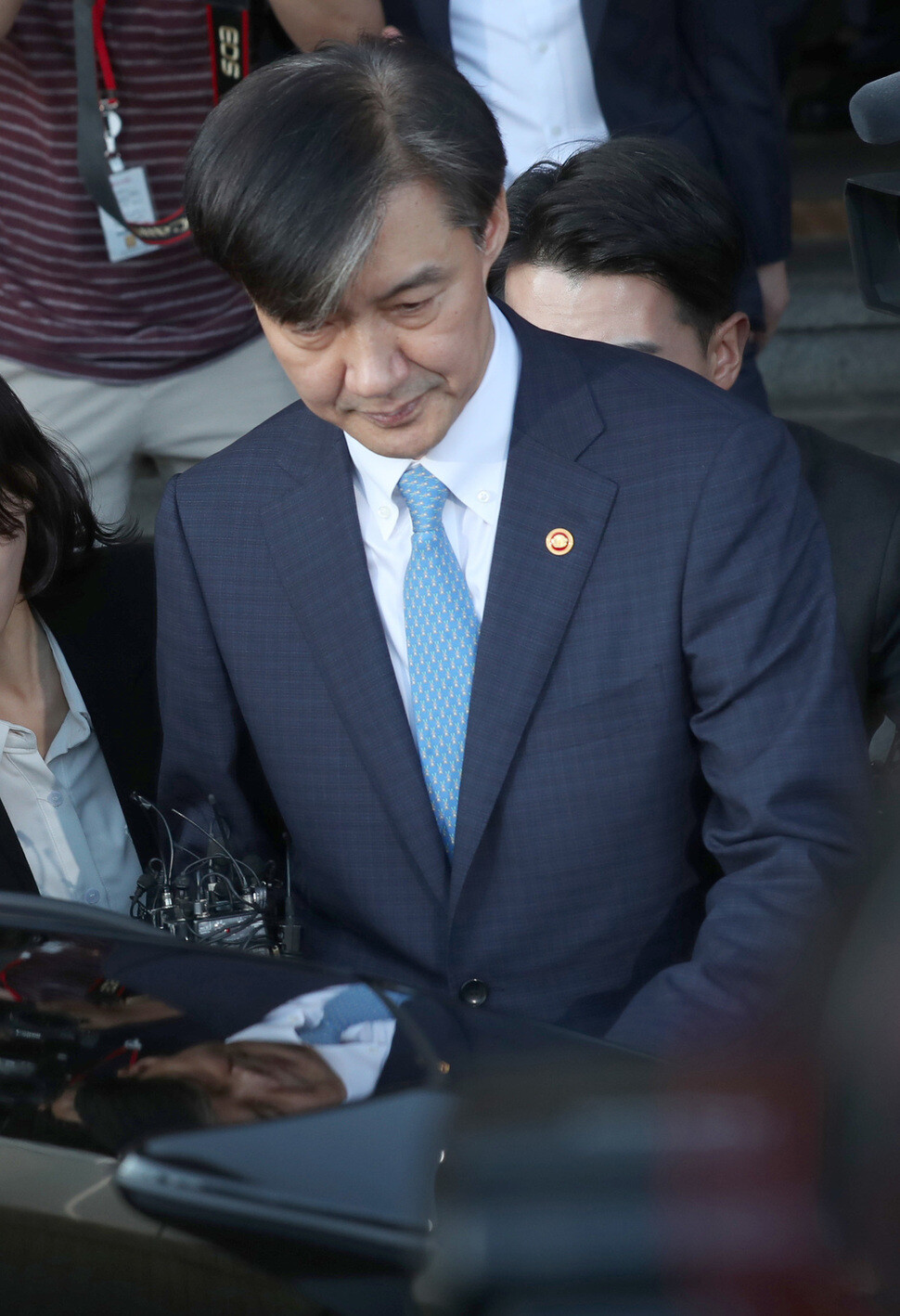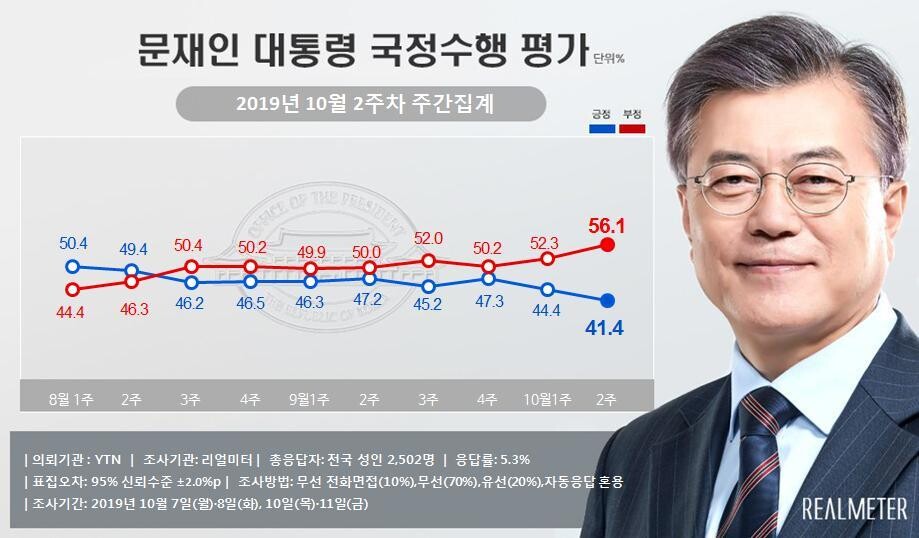hankyoreh
Links to other country sites 다른 나라 사이트 링크
[News analysis] Cho Kuk steps down as Justice Minister 35 days after appointment

Cho Kuk stepped down as Minister of Justice on Oct. 14. Coming 35 days after his appointment, the resignation brings an end to a saga that has had the political world in a muddle for over two months. By voluntarily bowing out after announcing a detailed implementation plan for prosecutorial reforms, he sent a message suggesting that he hadn’t been “forced out,” that the key reason for his resignation had to do with the public’s wishes. Given the slump in President Moon Jae-in’s governance approval ratings in recent surveys and the swiftly narrowing gap in support for the ruling and opposition parties, Cho’s decision appears to have been an inevitable response to souring public sentiment. It also comes across as a last-ditch strategy to inject new momentum into reforms at a time when the policies put forward by the administration and Blue House showed signs of being sucked into the Cho Kuk “black hole.”
Cho: “My role as kindling ends here”
Cho’s resignation announcement came at 2 pm. Two hours or so after giving an 11 am briefing at the Gwacheon Government Complex on prosecutorial reforms that included downscaling the special investigations divisions and changing its name, Cho issued a position statement titled “My role as kindling [for prosecutorial reforms] ends here.”
“For the past two and a half years, I’ve devoted all my energy as the [Moon administration’s] first senior presidential secretary for civil affairs and as the justice minister to prosecutorial reform, doing everything in my power,” he wrote.
“[But] something I never expected occurred. Regardless of the reasons [for the controversy], I apologize to the Korean people, especially to the young people who have been disillusioned,” Cho continued.
“I’m sorry to the people because of the investigation of my family, but as the justice minister I did everything I could in my last few days in office to ensure prosecutorial reform, dedicated to making every day count.“
The Blue House explained that the timing of Cho’s resignation was his own decision.
“He communicated his intent to resign after a senior-level party/administration council meeting the day before. It was Minister Cho’s decision,” said Ko Min-jung, Blue House spokesperson.
Hong Ik-pyo, senior spokesperson for the Democratic Party, said that “no one in the party knew before he announced it.”

Rapidly souring public opinion
The outward reason for Cho’s decision to step down was his having “devoted all [his] energy“ to prosecutorial reforms as Minister of Justice. Another factor looks to have been his conclusion that he needed to clear out at a time when the first round of candlelight demonstrations in Seoul’s Seocho neighborhood have ended and the key focus now is on legislating the reforms.
“He reported his plans for prosecutorial reform to the president and the party, and today he made his announcement to the public. It’s the National Assembly’s time now,” said a key ruling party figure.
“It’s a powerful message that says, ‘I will be removing myself as a stumbling block, and now you need to pass this legislation.’”
But the crucial factor is Cho’s decision to step down was negative public opinion, which was intensifying by the day. It reflected a general sense of urgency within the ruling party about the need to put an end to the Cho Kuk “situation” that had dragged on for over two months and to restore momentum to governance activities. Real Meter survey findings published the same day delivered a heavy shock to the ruling party, showing Moon’s approval ratings down three percentage points from the week before at 41.4% – the lowest it has been since he took office. The Democratic Party’s slim lead in support ratings over the Liberty Korea Party (LKP) had narrowed to 0.9 percentage points, which fell within the margin of error. Poll findings by one South Korean daily on Oct. 11 had support for the LKP at 34.7%, well ahead of the 33% for the Democratic Party.
With the general election six months away, fears have been intensifying by the day for Democratic Party lawmakers. The Blue House has also been feeling some consternation – concerned that a general election loss could undermine its governance base.
“If you go out into the streets, you can sense how the public’s sentiments have shifted,” said a Democratic Party lawmaker representing a constituency in Seoul. “People are even talking about us getting wiped out completely in Daegu and even Busan.”
Timing sends message of “not being forced out by prosecutors’ investigation”
After news of Cho’s resignation broke, the response within the ruling party was that the inevitable had come to pass. After making up his mind to step down, Cho reportedly discussed the timing of his announcement with the Blue House and Democratic Party leadership for the past two weeks.
“Minister Cho was given three dates, and he picked Oct. 14,” a ruling party figure explained.
Cho’s decision appeared to reflect his wish to stress that he was not being “forced out” by an ongoing investigation into his family by prosecutors. If he had chosen to step down shortly after the arrest or issuance of a warrant request for his wife, university professor Chung Kyung-shim, he would give the unavoidable impression of being driven out by the prosecutors. If prosecutors seek a warrant, their request is predicted to come around Oct. 22 – taking into account a scheduled Justice Ministry parliamentary audit on Oct. 15, a Supreme Prosecutors’ office audit on Oct. 17, and a comprehensive audit on Oct. 21.
With the possibility of opinion souring even more in the meantime, Cho is very likely to have opted for Oct. 14 as a date coming ahead of the Justice Ministry audit. The resignation timeline also appears to have been a consideration in the ruling party’s rush to schedule a senior-level party/government council meeting on Oct. 13 and Cho’s personal announcement of the prosecutorial reform plan on Oct. 14.
“Members of the Democratic Party legislation and judiciary committee agreed last week that Cho should resign as the justice minister before the Justice Ministry audit, and Cho himself heard about that,” explained a Blue House senior official. “That may have influenced his decision to step down on Oct. 14.”
Picking up the pieces from the “Cho Kuk episode”
Having sidestepped the “Cho Kuk episode,” the administration and ruling party now face the even more important task of picking up the pieces. In addition to producing concrete results with the prosecutorial reform plan, they also need to attend to issues surrounding South Korea’s educational system spotlighted by the episode, including questions about entrance examination fairness. Measures will need to address a widespread sense of loss among young people. Appointment vetting standards, which suffered a blow amid the push to appoint Cho, also need to be revamped. Whoever succeeds Cho is certain to become the first test case. Some observers are suggesting the Moon administration should look to renew the general governance climate by also switching out Prime Minister Lee Nak-yeon or other Cabinet members seen as due for replacement, including Minister of Land, Infrastructure and Transport and Minister of Education.
For Moon, fully escaping the shadow of the Cho Kuk episode will necessitate making policy changes and taking a new approach to subsequent appointments. Now that the ruling party has a chance to turn things around, the question of what results it can produce with reform legislation during the National Assembly’s regular session is seen as the crucial deciding factor in steering the situation going forward.
“What [the administration and ruling party] need to do right away is to appease moderates. It will be difficult to recover support ratings from another all-out attack without some candid introspection by the ruling party regarding how its camp’s ‘frame’ has been taken to extremes,” said Choi Chang-ryeol, professor of political science at Yong In University.
Park Seong-min, president of the political consultancy Min, said, “Certain individuals are going to need to be held accountable for pushing ahead with some incomprehensible decisions during Cho Kuk’s appointment process.”
“That’s the only way to turn around the public’s disappointment,” Park suggested.
By Kim Won-chul, Seo Young-ji, Jung Na-rae, and Lee Ji-hye, staff reporters
Please direct comments or questions to [english@hani.co.kr]

Editorial・opinion
![[Editorial] Intensifying US-China rivalry means Seoul must address uncertainty with Beijing sooner than later [Editorial] Intensifying US-China rivalry means Seoul must address uncertainty with Beijing sooner than later](https://flexible.img.hani.co.kr/flexible/normal/500/300/imgdb/original/2024/0517/8117159322045222.jpg) [Editorial] Intensifying US-China rivalry means Seoul must address uncertainty with Beijing sooner than later
[Editorial] Intensifying US-China rivalry means Seoul must address uncertainty with Beijing sooner than later![[Column] When ‘fairness’ means hate and violence [Column] When ‘fairness’ means hate and violence](https://flexible.img.hani.co.kr/flexible/normal/500/300/imgdb/original/2024/0516/7417158465908824.jpg) [Column] When ‘fairness’ means hate and violence
[Column] When ‘fairness’ means hate and violence- [Editorial] Yoon must stop abusing authority to shield himself from investigation
- [Column] US troop withdrawal from Korea could be the Acheson Line all over
- [Column] How to win back readers who’ve turned to YouTube for news
- [Column] Welcome to the president’s pity party
- [Editorial] Korea must respond firmly to Japan’s attempt to usurp Line
- [Editorial] Transfers of prosecutors investigating Korea’s first lady send chilling message
- [Column] Will Seoul’s ties with Moscow really recover on their own?
- [Column] Samsung’s ‘lost decade’ and Lee Jae-yong’s mismatched chopsticks
Most viewed articles
- 1Celine Song says she’s gratified global audiences have responded to the kismet of ‘inyeon’
- 2[Editorial] Transfers of prosecutors investigating Korea’s first lady send chilling message
- 3[Exclusive] Unearthed memo suggests Gwangju Uprising missing may have been cremated
- 4[Column] US troop withdrawal from Korea could be the Acheson Line all over
- 5For new generation of Chinese artists, discontent is disobedience
- 6Xi, Putin ‘oppose acts of military intimidation’ against N. Korea by US in joint statement
- 7Highly educated high-earners at risk of being replaced by AI, BOK study says
- 8Could Korea’s Naver lose control of Line to Japan?
- 9[Editorial] Intensifying US-China rivalry means Seoul must address uncertainty with Beijing sooner t
- 10Japan begins dumping irradiated Fukushima water amid outpouring of concern about vague timeline